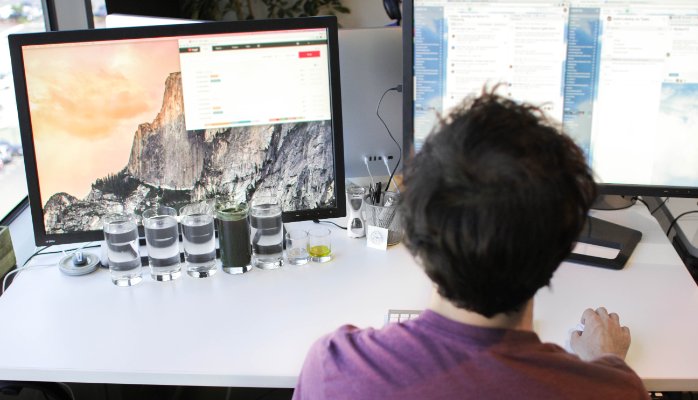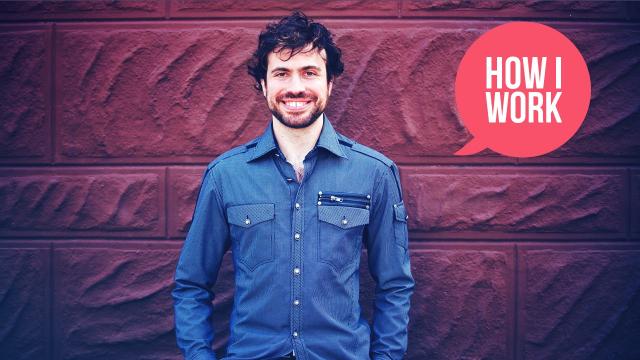It should come as little surprise that the creator of Asana, a popular project management tool, dutifully tracks his own work with eager intent. Every little detail matters to Justin Rosenstein, from the minutiae of how his product works to the five glasses of water carefully lined in a row on his desk in preparation for the day.
He keeps track of it all using his own app, of course. Justin created Asana just over a decade ago with Dustin Moskovitz, drawing on their experiences at Facebook and Google to explore better ways to collaborate and manage workflows. In fitting Lifehacker fashion, Justin applies that same perspective to just about all aspects of his life, optimising his health with vitamins, supplements and meditation breaks; collaborating with teammates to tackle complex projects and avoiding the pitfalls of multitasking. Here’s a look at how he works.
Location: Mission District of San Francisco
Current Gig: Co-founder & Head of Product at Asana
One word that best describes how you work: Purposefully. Both in the sense of mindfully choosing what I work on next based on its importance, and staying grounded in the larger purpose of the work I’m doing, even when I’m in the weeds of some implementation detail.
Current mobile device: iPhone
Current computer: MacBook Pro
What apps, software and tools can’t you live without?
I’d like to think I could live comfortably without any modern technology :-), but I sure am grateful for:
- SizeUp, for quickly rearranging windows without a mouse. Generally, I try to learn the keyboard shortcuts of every piece of software I use — not because I so desperately want back those extra few seconds, but because I want to maintain flow.
- Do Not Disturb mode on my phone, and generally all the features that let me turn off notifications. The temptations of multitasking are great, since it makes me feel more productive, but the research is clear that interruption is a huge productivity drain.
- Insight Timer, a simple timer for pleasant meditation breaks. I try to break for meditation a couple times a day. The few minutes of productivity “lost” are easily made up for by the increase in focus, energy and joy I experience during the rest of the day.
- You Are Your Own Gym. A ton of research (and direct experience) show the benefits of exercise for productivity and well-being, but the friction of going to a gym is just high enough that I won’t go as often as I want. You Are Your Own Gym guides you through a bodyweight training regimen that requires no equipment.
- Asana. It doesn’t have to be Asana, but I really recommend everyone use some work tracking system. Not only does it track every single part of my life and work, but it manages the flow of all the teams I’m on, so I don’t need endless meetings to keep everyone on the same page.
What’s your workspace setup like?

A sit-stand desk, sitting on the Asana open floor plan, on top of which are:
- Monitor / wireless keyboard / wireless mouse.
- Five tall glasses of water that I put on my desk at the beginning of the day, and drink over the course of the day to make sure I’m fully hydrated. One contains Athletic Greens, a supplement that Tim Ferriss recommends, and another contains Chinese medicine herbs that are either good for my energy or are a damn good placebo.
- A blue light that has been shown to improve your mood if you keep it on for a few minutes each morning.
- Three daily vitamin boxes, with a ton of supplements that my doctor recommended for improving energy and health, including krill and fish oils, vitamin C, drenamin, calcium-magnesium and immune-boosting mushrooms.
- A timer for reminding me to take a break every 90 minutes.
- A pad and pen for free-form idea drawing.
- Plant friends.
What’s your best time-saving shortcut or life hack?
Buddying. Some people love working alone, but, for complex tasks, I generally find it painful and prone to distraction. So I try to look at my task list at the beginning of the week and, for each thing, find a teammate who would enjoy collaborating on that work. Sometimes tasks that would have taken me two days can be completed in two hours with the right partner. (“Pair programming” is common in software engineering, but it works for anything.)
When there’s isn’t a good buddy available, I’ll actually have a conversation with myself by buddying up with a text editor or journal: I’ll start by writing down the big questions and then I write out the answers. I’ve had long, strategic, productive dialogues with my notebook like this, almost pretending that I’m writing as two different people going back and forth with each other.
Both buddying and pseudo-buddying are really useful for overcoming procrastination by facing discomfort.
I usually ask people what they use as a to-do list manager… and I suspect your answer is Asana. What do you use to keep track of things aside from Asana?
Naw, man. It’s all Asana. Whether you use Asana or something else, I find it critical to keep every little tiny detail, of every part of my life, in one place. I’ve got a project for each part of my work (product, management, culture, recruiting, marketing…) and then a project for each part of my personal life (health, community, spirituality, philanthropy, fun…). I use Google Calendar to block out big chunks of time to work on different areas, so that I’m not frantically context switching between unrelated kinds of work, and so that when I sit down to work on an area, I can choose the highest priority things from that particular project. And I keep a master schedule that’s like, “I want to spend four hours per week on management, four hours per week on recruiting, a solid week every six months on strategy.”
Besides your phone and computer, what gadget can’t you live without and why?
To hell with gadgets. I don’t want to live without my cats.
What everyday thing are you better at than everyone else? What’s your secret?
Delegation. Some people aspire to be indispensable, but my goal is the opposite: To be perpetually obsoleting myself. Once I’ve figured out how to do something well, I immediately try to teach it to someone else who would be excited to take over the responsibility. That way they get to learn and grow in a new area, and I can move onto figuring out something else I’m not yet good at.
What do you listen to while you work? Got a favourite playlist? Maybe talk radio? Or do you prefer silence?
Silence. Sometimes I wear big headphones without playing music, just to have more quiet.
Here’s an odd question I’ve been thinking about. Rather than ask what you’re currently reading, what book would you give to someone as a gift?
When it comes to maximising effectiveness, one of my favourite books is Tony Schwartz’s The Power of Full Engagement: Managing Energy, Not Time, is the Key to High Performance and Personal Renewal. Even the book’s name is a powerful reminder. It goes deep on how to arrange your life in a way that gives you as much energy as possible, so that rather than trying to slowly grind out work 60 hours a week, you can get more done by being extremely focused in short bursts.
I also recommend The 15 Commitments of Conscious Leadership, which is based on a leadership training program that we offer to every single Asana employee, many of whom report profound changes to how they live and work. Learning the skills from her book has been among the most important experiences of my life, dramatically changing me as both a person and a leader. Because of Conscious Leadership, Asana’s communication is clearer and more authentic, and Asana as a company is, I believe, more effective in succeeding in its mission.
How do you recharge? What do you do when you want to forget about work
Meditation, yoga, dance, sleep, eating mindfully, spending time in nature, music, festivals, running, relaxing with friends in community, chocolate.
What’s your sleep routine like? Are you a night owl or early-riser?
I sleep from roughly 10:00PM to 7:00AM every night. That’s how much sleep my body needs, for better and for worse.
Fill in the blank: I’d love to see _________ answer these same questions.
I was actually just discussing with a friend that I wish I had more insight into how people like Elon Musk, Larry Page, Bill Gates, Barack Obama or Beyonce manage to be so prolific, across so many different projects. In general, I think leaders could really benefit from sharing information about how we work day-to-day/minute-to-minute, something that’s common in most professions/trades but less so in leadership. So thank you for doing this interview series.
What’s the best advice you’ve ever received?
“Use ‘we’ instead of ‘I’.” I think this is the best advice I’ve received on leadership. This was 10 years ago, and it really profoundly changed my leader style. I used to find it tempting to talk about “my product” or “my plan”. I was pretty oblivious to how this was subtly demotivating the teams I worked with, who were pouring so much time into its creation.
But it was also inaccurate: No significant achievement is the result of just one person’s effort. Media and culture often fetishise leaders — as though Steve Jobs were the sole creator of the iPhone — but most everything great is a co-creation.
Changing my language — from “me” to “we” — was the first step in changing my attitude. Today, it sounds crazy to think of the people who work on Asana as “my” employees working on my project. They’re my teammates, and together we co-create our collective baby, the Asana product.
Is there anything else you’d like to add that might be interesting to readers and fans?
Optimising your ability to get things done is important only if the things that you’re getting done are important. Getting to your goal faster matters only if you’re driving toward a goal about which you care deeply. If you have the luxury to have some choice about what you work on: Take large chunks of time regularly to reflect. Reflect on what kind of world you want to see. Reflect on how you can apply your unique set of skills, passions and perspectives to contributing to shaping the world in the direction you want it to go.
We’ve asked heroes, experts and flat-out productive people to share their shortcuts, workspaces and routines. Want to suggest someone we should feature or questions we should ask? [contact text=”Let us know.”]

Comments
2 responses to “I’m Justin Rosenstein, Co-Founder Of Asana, And This Is How I Work”
Great answers Andy. You mentioned you take vitamins, Given you are an analytical evidence based guy, it would be interesting to hear why.
I’d imagine it’s because he had blood tests and his doctor told him he’s lacking in x, y, z vitamins. So he takes supplements to boost the numbers.